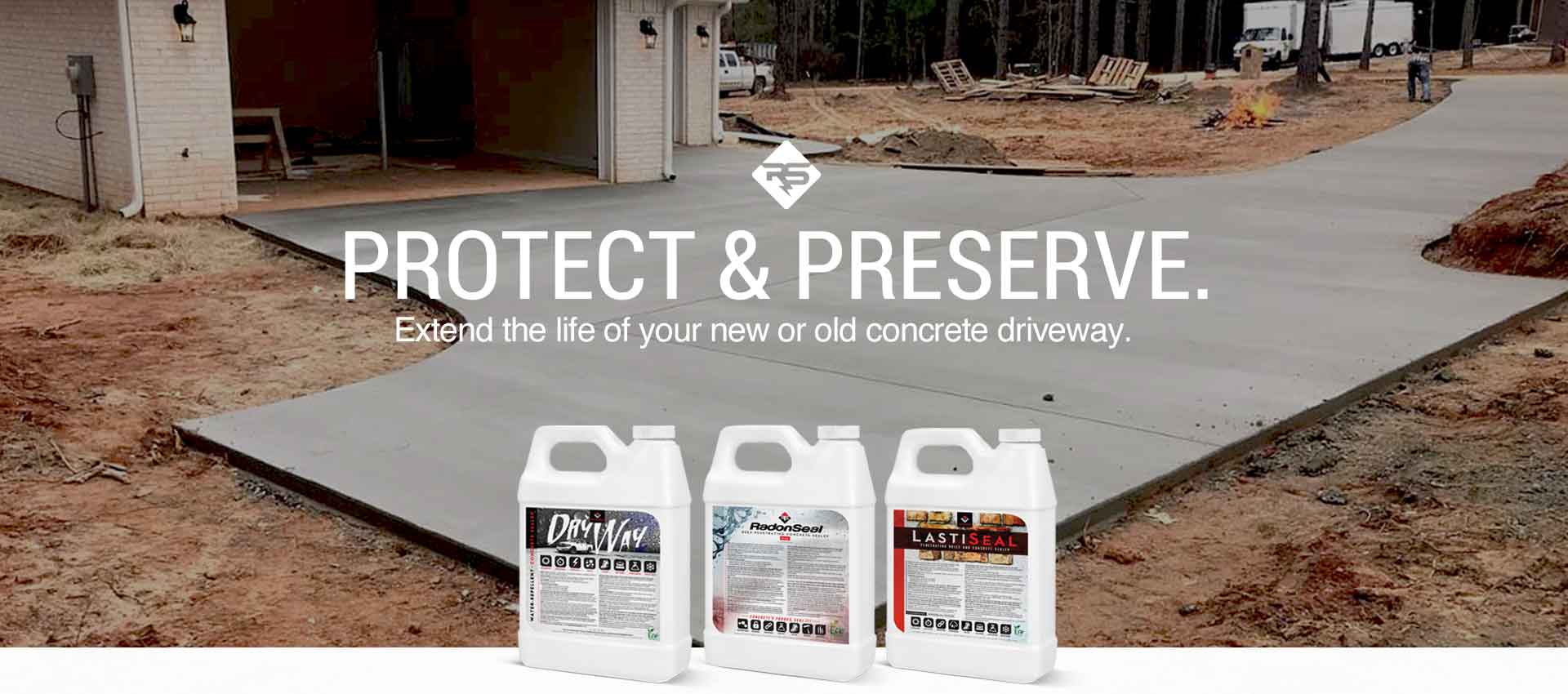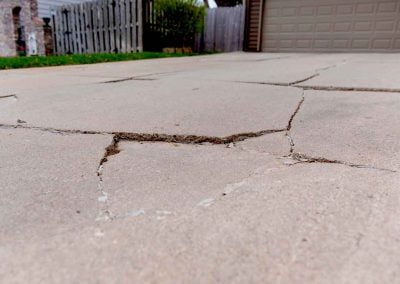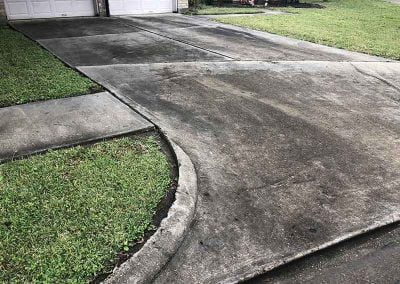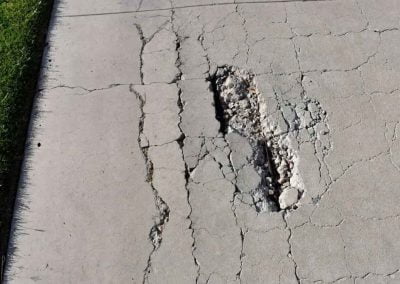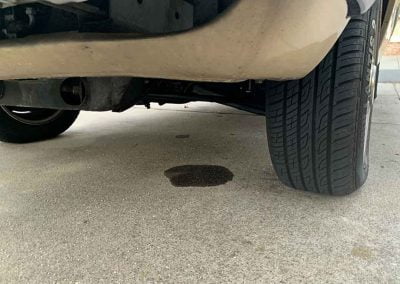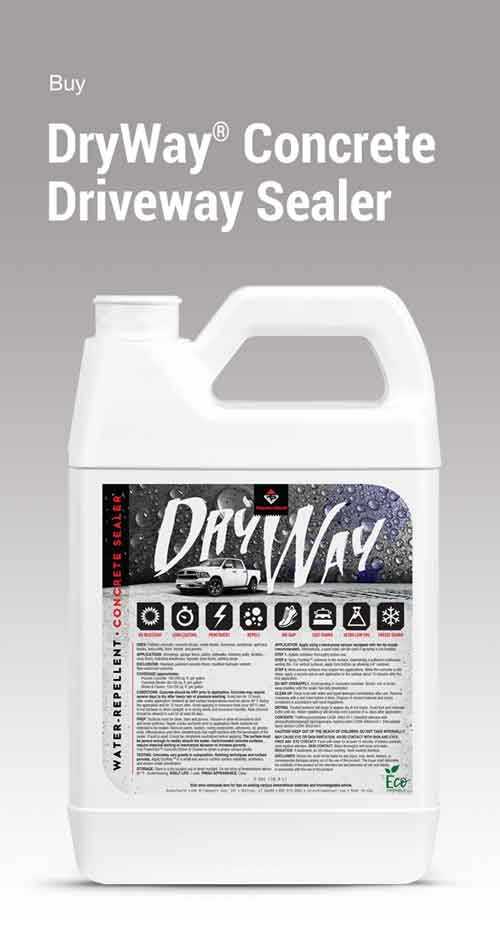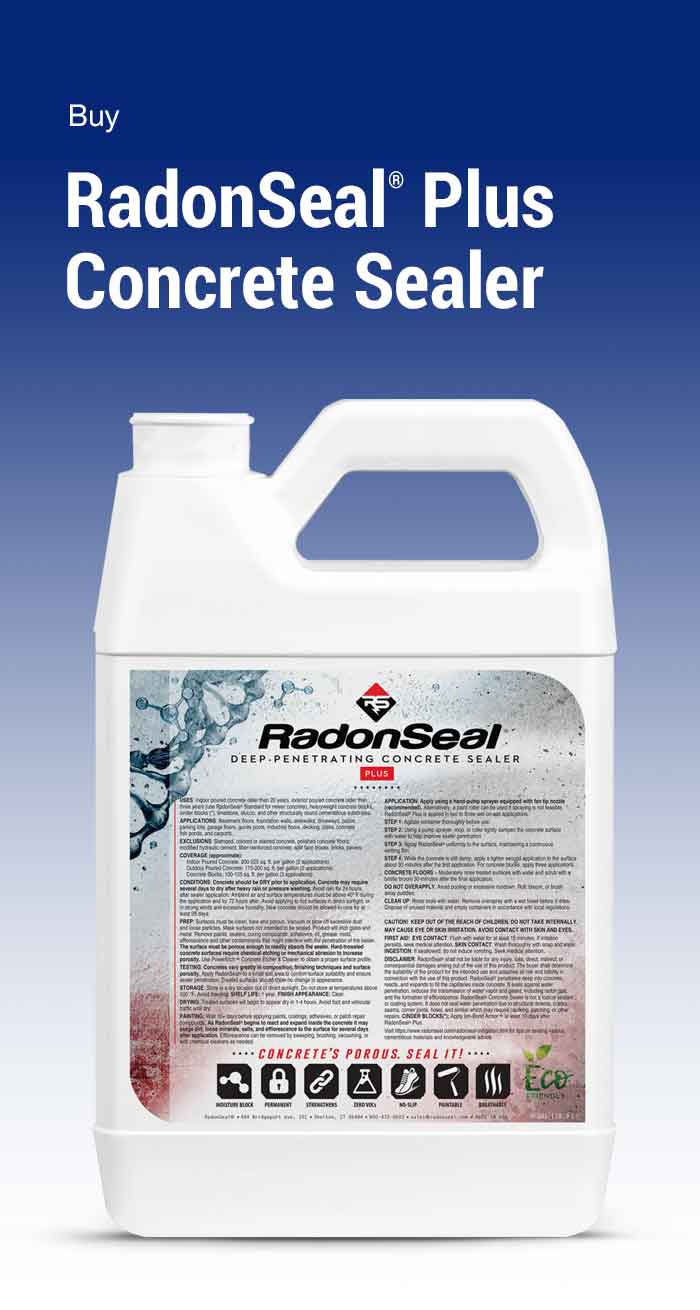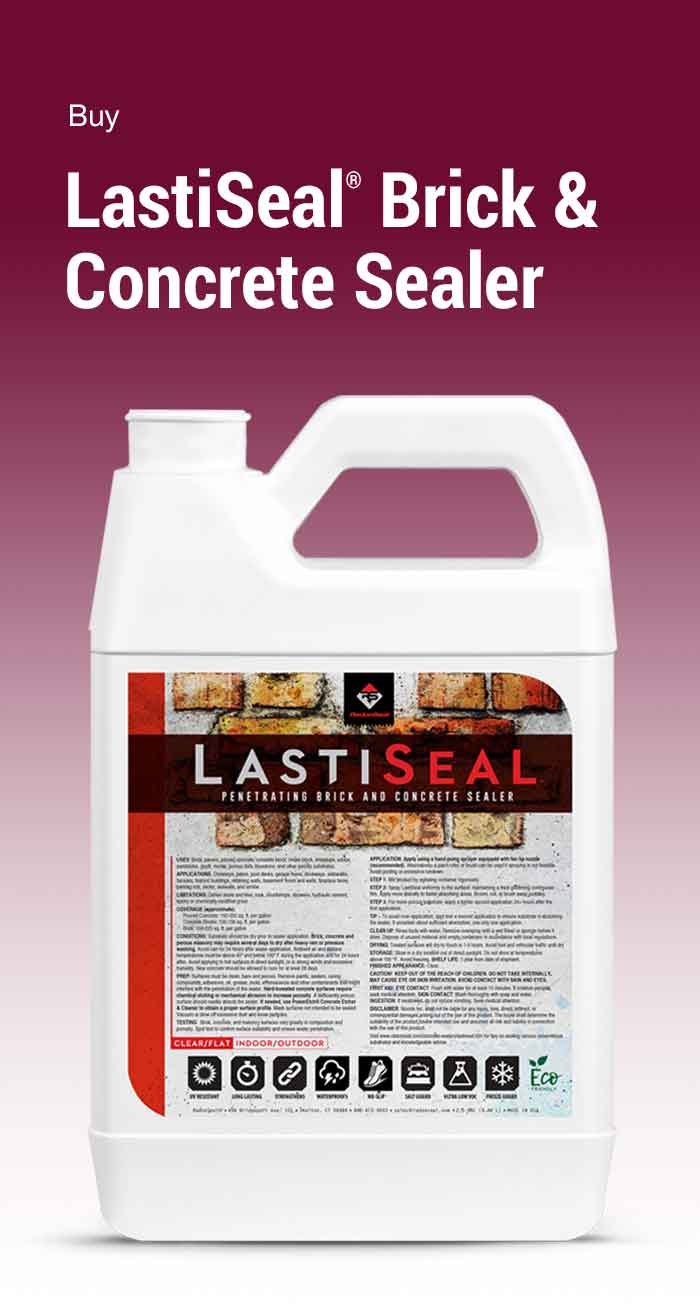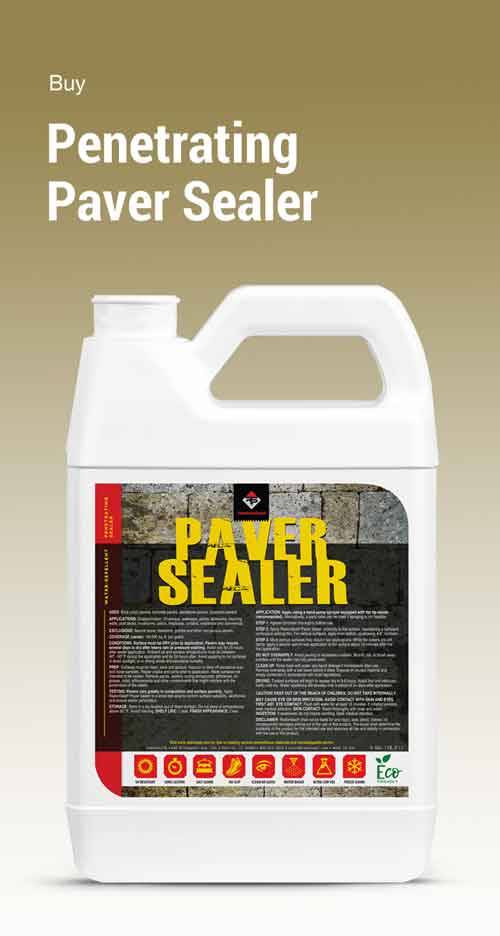Guide to Concrete Driveway Sealers
How do you choose the best concrete driveway sealer for your project?
It may sound simple, but with so many options—penetrating sealers, acrylics, high-gloss, wet-look sealers, and more—the decision can quickly become overwhelming. In this guide, we’ll break down the key benefits of sealing your driveway, compare the most common types of concrete driveway sealers, and help you choose the right product based on your climate, surface condition, and sealing goals.
Concrete is one of the most durable paving materials available. Under ideal conditions, a well-installed concrete driveway can last 30 to 50 years. But in the real world, factors like freeze-thaw cycles, road salt, moisture, heavy vehicles, and UV exposure often lead to cracking, surface wear, and staining much sooner.
The good news?
Applying a high-quality concrete driveway sealer is an easy and affordable way to:
-
Protect against water, salt, and freeze-thaw damage
-
Extend the life of your driveway
-
Preserve color and surface appearance
If your driveway is new, sealing it early will help prevent premature wear and staining. If it’s older or already showing signs of damage, the right sealer can help slow deterioration and restore long-term protection.
Types of Concrete Driveway Sealers
Choosing the best concrete driveway sealer for your project is a critical decision. While it may seem straightforward, the right type of sealer depends on your climate, driveway condition, and long-term goals. The better the sealer, the better the protection—but not all sealers are created equal.
Let’s break down the most common types of concrete sealers for driveways and how they perform in real-world conditions:
🔹 Acrylic Concrete Sealers (Wet Look / Glossy Finish)
These film-forming sealers are often marketed as “wet look” or “high-gloss concrete driveway sealers.” They work by forming a visible coating on the concrete’s surface, which darkens the color or adds a glossy finish. While the visual enhancement is immediate and attractive, the long-term performance on driveways—especially those exposed to vehicle traffic and UV rays—is poor.
✅ Pros:
-
Easy to apply: Most are ready-to-use and can be rolled or sprayed on with basic tools.
-
Visually enhances the surface: Adds rich color and a shiny, wet appearance—especially on stamped or decorative concrete.
-
Affordable upfront cost: Lower price point makes it appealing for short-term aesthetic projects.
❌ Cons:
-
Poor durability under vehicle traffic: The thin coating wears away quickly in high-use areas like driveways and parking pads.
-
Becomes slippery when wet: The glossy finish reduces traction, increasing the risk of slips—especially dangerous on sloped or wet driveways.
-
Fades and discolors from UV exposure: Sunlight causes the coating to yellow, chalk, or become patchy within a few months.
-
Requires frequent reapplication: Most acrylic sealers break down within 6–12 months, needing repeated maintenance and stripping before recoating.
👉 Our take: Not recommended for driveways. These sealers may look great initially but break down rapidly under real-world driveway conditions. If you’re sealing a decorative patio, garden path, or low-traffic walkway, a wet-look acrylic sealer may be a good fit. But for long-term driveway protection, choose a penetrating concrete driveway sealer designed for durability, water resistance, and salt protection.
🔹 Silane & Siloxane Concrete Driveway Sealers
These penetrating concrete driveway sealers work just beneath the surface to create a hydrophobic barrier that repels water, deicing salts, and chlorides. Ideal for freeze-thaw climates, snowy regions, and coastal environments, silane/siloxane sealers protect without changing the appearance of the concrete.
They do not form a film on the surface—instead, they chemically bond within the pores, offering long-lasting protection without peeling, flaking, or becoming slippery.
✅ Pros:
-
Excellent water and salt resistance: Blocks liquid intrusion and prevents salt scaling, a common problem in winter climates.
-
Long-lasting protection: Expect 3–7 years of durability before reapplication is needed—much longer than acrylic coatings.
-
Breathable sealer: Allows water vapor to escape from below the surface, preventing moisture entrapment and blistering.
-
Low maintenance: No film to wear off or strip, and no glossy sheen to dull over time.
❌ Cons:
-
Does not strengthen concrete: These sealers repel water but don’t improve the structural integrity of the slab.
-
Not for below-grade waterproofing: Ineffective against hydrostatic pressure or rising moisture—not suitable for basements or slabs-on-grade with moisture issues.
-
No visual enhancement: Leaves the surface looking untreated; no wet look or sheen.
👉 Our take: For driveways in cold or coastal regions, a silane/siloxane concrete driveway sealer is an excellent choice. It guards against freeze-thaw damage and salt corrosion without altering the surface or requiring constant upkeep. If you’re looking for the best concrete driveway sealer for cold climates, this type of penetrating sealer is a proven performer. For best results, choose a DOT-approved formulation tested under harsh conditions.
🔹 Polyurethane & Polyester Penetrating Concrete Driveway Sealers
A major step up from acrylic and siloxane-based sealers, these high-performance penetrating sealers are engineered for deep penetration, structural hardening, and long-term durability. Once absorbed, they chemically cure inside the concrete, binding the matrix and forming a hardened, dust-free surface that resists wear, water, and deicing salts.
Unlike film-forming sealers, polyurethane and polyester sealers don’t just coat the surface—they become part of the concrete, offering years of protection even under harsh conditions.
✅ Pros:
-
Deep penetration: Reaches further into the concrete for superior internal protection.
-
Strengthens the concrete: Chemically bonds within the pores to harden the surface and reduce wear.
-
Excellent water, salt, and abrasion resistance: Ideal for high-traffic areas, sloped driveways, or climates with harsh winters.
-
Extremely long-lasting: Expect multi-year protection without reapplication—outlasts siloxane and acrylic sealers.
❌ Cons:
-
Higher cost: More expensive than entry-level sealers—but offers far better value over time.
-
Limited compatibility with paints or coatings: May reduce adhesion if you plan to paint or topcoat.
👉 Our take: For homeowners who want the best long-term protection for their concrete driveway, polyurethane and polyester sealers deliver professional-grade results. If your driveway sees frequent vehicle use or is exposed to deicing salts, rain, and snow, this is one of the best concrete driveway sealer options available—offering strength, depth, and unmatched durability.
🔹 Reactive Silicate Concrete Driveway Sealers (Sodium or Lithium Silicates)
If you’re looking for maximum durability and permanent protection, reactive silicate sealers are among the best concrete driveway sealer options—especially for older, weathered, or high-traffic slabs. These penetrating sealers chemically react with free lime in the concrete to form calcium silicate hydrate (CSH), a gel-like compound that fills and seals the pores from within.
Unlike film-forming or water-repellent sealers, silicates don’t coat the surface. Instead, they permanently densify and strengthen the concrete deep inside, increasing resistance to cracking, dusting, wear, and water intrusion—even under negative-side water pressure.
✅ Pros:
-
Permanently densifies concrete: Fills pores with durable CSH, making the slab harder and more resilient.
-
Resists water intrusion from below: Ideal for slabs-on-grade or driveways prone to rising moisture.
-
Won’t peel, flake, or wear off: The reaction happens inside the concrete—nothing to scratch or delaminate.
-
Leaves surface open: Great for driveways you plan to paint, stain, or top with coatings.
-
Industrial-grade performance: Used on airport runways, bridge decks, tunnels, and warehouse floors.
❌ Cons:
-
No visible surface change: You won’t get a glossy or enhanced appearance—no “wet look” or beading.
-
Not water-repellent: Repels water by density, not by hydrophobic chemistry. For water repellency, combine with a siloxane topcoat.
👉 Our take: For homeowners who want to strengthen their concrete driveway from the inside out—without changing its appearance—reactive silicate sealers are a smart, permanent solution. While they don’t repel water at the surface like silanes or acrylics, they offer unmatched protection against internal moisture, spalling, and long-term wear. Perfect for high-traffic driveways or those prone to cracking and dusting.
⚠️ Avoid Epoxy Coatings on Outdoor Concrete Driveways
While epoxy coatings are great for garages and indoor floors, they are not suitable for exterior concrete. Epoxy traps moisture within the slab, which can lead to bubbling, delamination, and failure—especially under UV exposure.
Why avoid epoxy on driveways?
-
Not breathable – traps moisture vapor rising from below
-
UV sensitive – yellows and degrades in sunlight
-
Slippery – dangerous when wet
-
Not freeze-thaw resistant
Learn more about the types of Concrete Sealers.
Benefits of Using a Concrete Driveway Sealer
Whether your concrete is brand new or years old, applying a concrete driveway sealer is one of the smartest ways to protect your investment. These products create a protective barrier that shields your driveway from water, salt, stains, and harsh weather—helping to extend its lifespan and maintain its appearance.
Here’s how a high-quality concrete driveway sealer can protect and enhance your surface:
🛡️ Increased Water Resistance
Water is concrete’s worst enemy. Unsealed concrete absorbs water deep into its pores, allowing stains and contaminants to penetrate. Worse, water can dissolve internal salts, cause efflorescence, and lead to rebar corrosion—which cracks the concrete from within as rust expands.
A penetrating concrete driveway sealer helps block water absorption, protecting against internal damage and long-term deterioration.
❄️ Protection from Freeze-Thaw Damage
In cold climates, water inside concrete pores can freeze and expand by 9%, causing the surface to spall or flake off. This cycle of freezing and thawing leads to delamination and structural weakening.
Sealing your concrete driveway helps prevent water intrusion, dramatically reducing the risk of freeze-thaw damageduring winter months.
🧂 Salt and De-Icer Resistance
Salt is highly destructive to concrete. Calcium chloride, commonly found in deicers, reacts with compounds in concrete to form calcium oxychloride, which expands and damages the slab from the inside.
Salt also lowers the freeze point of water, allowing it to penetrate deeper into the slab. A concrete driveway sealer helps block both the moisture and chemical reactions that cause salt-related damage—especially important if you live in snowy regions or near the coast.
🧼 Improved Stain Resistance
Concrete is naturally porous and easily absorbs oil, tree sap, tire marks, and engine fluids. Once absorbed, these stains are nearly impossible to remove.
With a sealed concrete driveway, most stains stay on the surface—making cleanup much easier. While spills may still happen, sealed concrete gives you time to react before permanent staining sets in.
🌿 Prevent Mold, Algae, and Mildew
Shady or damp areas of your driveway are breeding grounds for moss, algae, and mold. These growths not only discolor the surface but also make it slippery and unsightly.
Because sealers reduce moisture absorption, they help your driveway dry faster and stay cleaner, making it more resistant to biological growth.
🧱 Stronger, Harder Concrete Surface
Some premium sealers do more than protect—they actually strengthen your driveway. Products with built-in chemical densifiers react with the concrete to increase hardness, reducing dusting, chipping, and surface wear.
If durability is a top concern, look for a penetrating concrete driveway sealer that also improves the strength and integrity of the slab.
🔧 Lower Maintenance, Fewer Repairs
Sealing concrete reduces the need for frequent cleaning and costly repairs. Without constant moisture and stains penetrating the surface, you won’t need your pressure washer nearly as often.
A sealed driveway stays cleaner, lasts longer, and saves you time and money in the long run.
Helpful Resources:
How to Remove Tire Marks from Concrete
How to Remove Efflorescence from Concrete
Read Customers’ feedback and tips on Sealing Outdoor Concrete
Not All Concrete Driveways Are Created Equal
Even the best concrete sealer can only protect what’s already there. Unfortunately, not all concrete driveways are built the same. Mistakes during the mixing, pouring, or curing process can lead to weak, porous, or cracked concrete—making it far more vulnerable to weather, salt, and wear.
🚫 Common Issues in Poorly Poured Concrete Driveways
Many concrete problems originate before you ever apply a concrete driveway sealer. Key issues include:
1. High Water-to-Cement Ratio (w/c)
-
Too much water weakens the concrete matrix and increases porosity.
-
Example:
-
0.4 w/c → ~5,600 psi compressive strength
-
0.8 w/c → ~2,000 psi (a 64% reduction in strength)
-
2. Surface Laitance
-
A weak, dusty layer caused by excess water, rain, or overwetting during finishing.
-
Reduces bond strength and surface durability.
3. Improper Curing
-
Concrete hardens through hydration—not drying.
-
Without adequate moisture during the cure, hydration stops prematurely.
Moist-curing for 20 days can produce concrete twice as strong as concrete cured for just 4 days.
4. Rapid Drying & Shrinkage Cracks
-
When the surface dries too fast, it contracts and cracks while the interior remains moist.
-
This leads to surface flaws like crazing and early-age shrinkage cracks.
5. Poor Finishing Practices
-
Over-troweling or placing control joints too far apart causes stress fractures and premature cracking.
🛠️ What This Means for Your Driveway
If your concrete driveway is:
-
Cracking, chalking, or showing signs of wear
-
Located in a freeze-thaw or coastal zone
-
Pour date is unknown or the quality is questionable
…then applying a high-quality concrete driveway sealer is critical.
A good driveway sealer can:
-
Reduce porosity and surface breakdown
-
Strengthen weak concrete with densifiers (for reactive silicate or polyurethane sealers)
-
Resist freeze-thaw cycles, salt scaling, stains, and moisture infiltration
✅ Pro Tip: Choose the Right Sealer for Flawed Concrete
For older or improperly cured slabs, avoid glossy coatings that trap moisture. Instead, choose a penetrating concrete driveway sealer that:
-
Soaks into the pores and hardens from within
-
Strengthens and seals without forming a slippery surface film
-
Is rated for high water exposure or salt attack
The best driveway sealer is the one that fits your concrete’s condition—not just the weather.
How Much Does a New Concrete Driveway Cost?
Installing a concrete driveway is a major investment—and it’s more expensive than many homeowners expect. Here’s a realistic breakdown of average costs:
🧱 Concrete Driveway Installation Costs (Based on 650 sq. ft.)
| Item | Estimated Cost |
|---|---|
| Concrete (avg. $9.00/sq.ft.) | $5,850 |
| Gravel base preparation | $650 |
| Labor | $1,000 |
| Materials & forms | $500 |
| Removal of old driveway | $1,000–$5,000+ |
| Total Estimated Range | $9,000 – $13,000+ |
🛡️ Protect Your Investment with a Concrete Driveway Sealer
After spending thousands of dollars on a new concrete driveway, it only makes sense to protect it from damage. The best way to do that? Apply a penetrating concrete driveway sealer.
RadonSeal® Deep Penetrating Concrete Sealer costs roughly $0.19 per square foot—a small price to:
-
Prevent cracking, pitting, and spalling
-
Defend against water, salt, and freeze-thaw cycles
-
Prepare the surface for glossy sealers, water repellents, or stains
💡 A $200 sealer investment can extend the life of your $10,000 driveway by 10–15 years.
✅ Bottom Line
If you’re looking for a simple, affordable, and effective way to protect your concrete driveway, sealing it with a high-quality concrete driveway sealer is the smartest move you can make.
🧩 What to Expect From a Concrete Driveway Sealer
A high-quality concrete driveway sealer should do more than just darken the surface or make it shine. For true protection and long-term performance, your sealer must meet a few critical standards:
🌬️ Breathability: Let Concrete Breathe
Concrete is a naturally porous material, and it needs to breathe. It draws water up from the ground by capillary action and allows water vapor to pass through its pores.
The problem with surface coatings like epoxies and urethanes is that they trap moisture inside. When water vapor gets sealed in:
-
Efflorescence forms—white staining or clouding beneath the coating
-
Vapor pressure builds, causing the sealer to blister, bubble, or peel
-
Long-term moisture exposure accelerates deterioration
⚠️ The #1 cause of driveway sealer failure is trapped moisture.
Penetrating concrete sealers, like silicates or polyester, are breathable—they allow vapor to escape while still protecting against liquid intrusion.
🚫 Non-Slip Surface Safety
Most concrete driveways and patios have a broom-finish to provide texture and prevent slipping.
However, film-forming sealers (like acrylics) can create a slippery surface, especially when wet. This is a serious hazard on:
-
Sloped driveways
-
Pool decks
-
Entryways and steps
Penetrating sealers, on the other hand, do not alter surface texture, making them naturally slip-resistant and safer for outdoor concrete.
💪 Durability: Protection That Lasts
Your concrete driveway faces constant abuse—vehicle traffic, deicing salts, oil spills, freezing temps, UV rays, and more. That’s why durability is the most important quality in any concrete driveway sealer.
Look for a product that can:
-
Withstand daily wear-and-tear
-
Resist freeze-thaw cycles and salt damage
-
Last several years before needing reapplication
✅ The best concrete driveway sealers offer long-term protection without flaking, peeling, or requiring constant maintenance.
🏆 Choosing the Best Concrete Sealer for Your Driveway
At RadonSeal, we manufacture only the highest-quality concrete driveway sealers—engineered for long-term performance and ease of use. Our approach is simple: create affordable concrete sealers that outperform the competition in both durability and safety.
To ensure maximum protection, all RadonSeal driveway sealers are penetrating sealers. They work below the surface, sealing the concrete internally—unlike topical coatings that sit on top and wear away.
Every RadonSeal concrete sealer meets or exceeds these essential criteria:
-
✅ Durable – Delivers permanent or multi-year protection, even under heavy use.
-
🌬️ Breathable – Allows moisture vapor to escape, preventing damage from trapped water.
-
🚫 Non-Slip – Does not form a film or alter surface texture—safe for sloped or wet driveways.
-
🌱 Eco-Safe – Water-based formulas with ultra-low VOCs, safe for people, pets, and plants.
-
🛠️ Easy to Apply – Use a garden sprayer, roller, or brush—no special tools or experience required.
🔎 Looking for the best concrete sealer for a driveway, patio, or sidewalk? RadonSeal offers the widest selection of professional-grade penetrating concrete sealers—designed to meet the demands of both residential and commercial applications.
Silane/siloxane concrete sealer that penetrates below the surface, into the pores of concrete and paver driveways. Also available as DryWay PLUS, which carries the US DOT-Approval for water and salt protection.
Key Features
Versatile – Use on driveways, garage floors, pool decks, pavers, patios, stucco, colored concrete
Beads Water – Shed’s rainwater, oil, and fluid spills.
Protects Concrete Surfaces – Superior protection against freeze-thaw, road salts, and de-icers.
Saves Money – Lessens bond of ice and snow, saves on labor and use of snow-melting chemicals.
Low Maintenance – Spills clean-up more easily.
Reduces – Efflorescence, mold, and algae growth.
Long Lasting – Estimated service life of 10 years
Safe – Zero VOCs, Non-corrosive, Plant-Safe, Slip Resistant.
Permanently strengthens and seals concrete driveways. This silicate sealant protects outdoor concrete against damage from rainwater, groundwater, ice, spills, road salts, rebar corrosion, and chemicals.
Key Features
Seals All Concrete – Driveways, garage floors, basements, slabs, walls, concrete blocks, cinder block
Prevents – Efflorescence
Reduces – Spalling, pitting, flaking, concrete dusting
Preserves – Extends the life of the concrete by strengthening and bonding it
Permanent – No reapplication required
Safe – Zero VOCs, no noxious fumes
Strong – Seals against hydrostatic pressure, and acts as a great primer for paints, coatings, levelers
No Surface Film – Does not change the appearance or profile of the concrete
State-of-the-art penetrating sealer that waterproofs and strengthens concrete, brick, pavers, and porous stone. Unmatched performance and durability. A unique blend of polyester and polyurethane polymers.
Key Features
Long Lasting – Unsurpassed protection and service life. Last 2 x longer than silane/siloxane sealers & 10 x longer than acrylic sealers.
All-Purpose – Use for sealing concrete, brick, pavers, porous stone, limestone, porous tiles, mortar, concrete blocks, and grout.
Protects – Protects rebar from corrosion and concrete against salts, and deicing chemicals.
Bond Surfaces – Hardens surfaces to prevent dusting and minimize cracking, and spalling
Penetrating – Slip resistant, seals below the surface, clear
Safe – Ultra-low VOCs, no noxious fumes
Reduces – Efflorescence
Premium-grade penetrating paver sealer designed specifically for porous clay, brick, and concrete pavers. A water-based blend of silane and siloxane polymers, designed to keep your pavers looking their best.
Key Features
Water-Repellency – Repels surface water. Stain-resistant. Keeps your pavers looking their best.
Freeze & Salt Guard – Protect pavers against damage caused by deicing chemicals, freeze/thaw, and salts.
10-Year Service Life – Frequent reapplications are a thing of the past. Save time and money.
Eco-Friendly – For both indoor/outdoor use. Safe for plants and pets.
LOW VOCs – Water-based, non-flammable, non-toxic, no strong odors or harmful vapors.
Invisible Finish – Non-film forming sealer. No gloss or sheen. Treated surfaces are not slippery.
Most Recent Reviews Online
How To Repair Driveway Cracks, Spalls & Control Joints
Before sealing your concrete driveway, it’s important to repair any cracks, pits, or spalls. Sealers are designed to protect the concrete, but they cannot fill or repair structural flaws. Here’s how to properly fix common imperfections before applying a concrete driveway sealer:
🔧 How to Repair Hairline and Stress Cracks in Driveways
For full-depth cracks ranging from hairline to ½” wide, use CrackWeld Concrete Crack Repair Kit. It’s a professional-grade, DIY-friendly solution for:
-
Structural cracks caused by shrinkage or settling
-
Active cracks that need a rigid, non-flexible repair
-
Prepping your driveway before resurfacing or sealing
✅ Fast-curing | ✅ Permanently bonds the crack | ✅ Stops cracks from growing
🛠️ How to Repair Wide Cracks, Spalls, and Pitting
For larger surface damage—including pitted areas, wide cracks, and surface scaling—use ElastiPoxy Joint & Crack Filler mixed with sand:
-
Apply with a putty knife or trowel
-
Cures to a strong, rigid compound
-
Ideal for deep patching and spall repair on driveways
🧩 How to Repair Control Joints and Expansion Joints
To repair or refill joints between driveway sections—or between the driveway and garage slab—use ElastiPoxy Joint & Crack Filler without sand:
-
Pour directly into the cleaned joint until level
-
Remains slightly flexible to accommodate slab movement
-
Durable enough for heavy vehicle traffic
💡 Pro Tip:
Always repair damage before sealing. Sealers can’t fix structural flaws—they can only protect what’s already there. Repair cracks and joints first for the best long-term performance.
